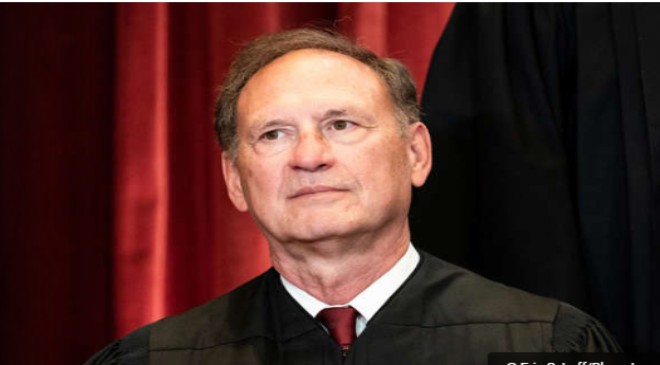In his first public address since the explosive leak of a draft Supreme Court opinion he wrote that would overturn Roe v. Wade, Justice Samuel A. Alito Jr. breezed through a detailed examination of statutory textualism, and renewed a disagreement over the court’s decision saying federal discrimination law protects gay and transgender workers.
But he was a little stumped by the final audience question from a crowd at Antonin Scalia Law School at George Mason University: Are he and the other justices at a place where they could get a nice meal together?
“I think it would just be really helpful for all of us to hear, personally, are you all doing okay in these very challenging times?” the questioner asked.Supreme Court is ready to strike down Roe v. Wade, leaked draft shows
The fact that Alito was speaking via closed circuit from a room at the Supreme Court seven miles away, rather than in person, was a sign these are not normal times.
“This is a subject I told myself I wasn’t going to talk about today regarding, you know — given all the circumstances,” Alito replied.
After a pause, he added: “The court right now, we had our conference this morning, we’re doing our work. We’re taking new cases, we’re headed toward the end of the term, which is always a frenetic time as we get our opinions out.”
The court gathered Thursday for the first time since the draft opinion was disclosed to Politico and the court’s chief justice, John G. Roberts Jr., opened a leak investigation.Supreme Court will investigate leaked draft of abortion opinion
After detailing the schedule for getting the court’s work done by the end of June or early July, Alito skipped the usual boilerplate that justices tend to employ about disagreeing about the law but remaining respectful and friendly.
Instead, he concluded: “So that’s where we are.”
The disclosure of the draft opinion, indicating at least five members of the court at least tentatively voted to overturn Roe’s guarantee of the right to abortion, has shaken the court, which prides itself on private deliberations. Protesters demonstrated at Alito’s home, not far from the George Mason campus, and were in force outside Thursday’s ticketed event, the fourth annual Scalia Forum.

As attendees filed into the law school event, roughly two dozen protesters on both sides of the abortion issue shouted chants outside at a campus plaza near the law school building in Arlington, Va.
“Hey hey, ho ho, Alito has got to go! Hey hey, ho ho we must defend Roe!”
The group was largely George Mason students who skipped studying for final exams to demonstrate.
“I had a final last night and I have a final tomorrow,” said Adam Rizzoli, a 19-year-old first-year student from Vienna, Va. But, he added, some things are more important than one’s GPA. “Sometimes you just have to act.”
Several students traveled from the university’s main campus in Fairfax to denounce the school’s decision to host Alito and to voice their support for abortion rights.
“As a Mason student, the support of a justice that is supporting outdated constitutional interpretations at the expense of women everywhere, it feels like a slap in the face,” said Emily Williams, 21, a junior.
A group of five antiabortion counterprotesters assembled about 30 feet from the other group. Christine Gomez, 20, a sophomore at Northern Virginia Community College and member of Students for Life of America, shouted through a megaphone, briefly obscuring the voices of the original group.
“Abortion is violence! Abortion is oppression!”
Gomez, who is studying psychology, said she wanted to come to George Mason’s campus to make sure her side of the abortion debate was heard.
Alyssa Thoburn, a freshman studying criminal justice at Liberty University, echoed Gomez.
“People think we hate women, some people say we’re anti-birth control,” Thoburn said. “We just want people to have the right to life.”

Alito’s topic centered on how Scalia, who died in 2016, had transformed the court’s methods of reviewing federal laws, putting far more emphasis on the text of the law rather than the intent of Congress. It is a method he favors, Alito said, but it was used incorrectly in the gay rights case, Bostock v. Clayton County.
In that case, the court ruled 6 to 3 that a landmark federal civil rights law from the 1960s protects gay and transgender workers, a watershed ruling for LGBTQ rights written by one of the court’s most conservative justices, Neil M. Gorsuch.
Gorsuch and Roberts joined the court’s liberals in the ruling. They said Title VII of the Civil Rights Act of 1964, which prohibits discrimination “because of sex,” includes gay and transgender employees.
Gorsuch is a “colleague and friend,” Alito said, and someone he is happy to have on the court. But he said the decision relying on the text of the law alone was “in my view indefensible.”
While he said he wasn’t defending past actions, Alito said it was clear Congress at that time allowed and practiced discrimination.
“It is inconceivable that either Congress or voters in 1964 understood discrimination because of sex to mean discrimination because of sexual orientation, much less gender identity,” Alito said. “If Title VII had been understood at that time to mean what Bostock held it to mean, the prohibition on discrimination because of sex would never have been enacted. In fact, it might not have gotten a single vote in Congress.”
He said the majority cited an opinion written by Scalia to justify its decision, but he thought had misunderstood it.
“I only wish Nino were here to enlighten us,” Alito said. If Scalia said Alito was wrong, “I would take that evaluation in good humor, and learn from the exchange,” the justice said.

































